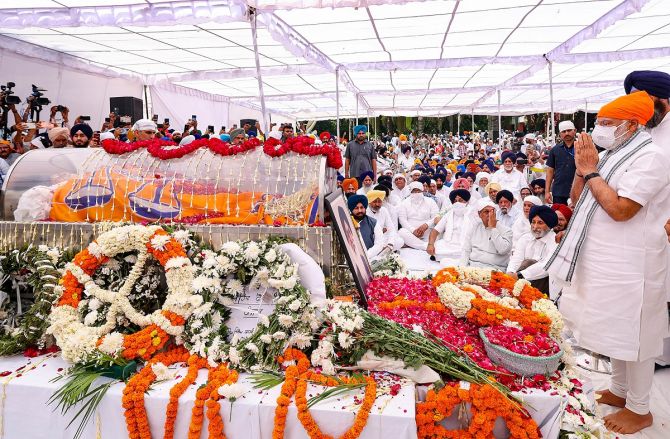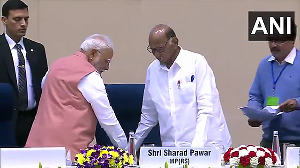'Mr Badal wanted to talk to a member of the Gandhi family to bring about some sort of rapprochement between the Akalis and the Congress which were the two major parties at that time.'

"We made all the arrangements for the secret meeting between Rajiv Gandhi and Badal. Rajiv Gandhi would be incognito and before anybody realised anything, Mr Badal would be taken back to his room in the jail.
"My wife even cooked some continental food, but just a day before the meeting I got a call that Rajiv couldn't come.
"Apparently Mrs Gandhi had been advised by her advisors not to negotiate. I went back to Mr Badal and told him that Rajiv's visit has been cancelled and the Congress was ready to send Swaran Singh, but this was not acceptable to him.
"His prophetic words were that if we do not come to some settlement, then the coward sitting in the Golden Temple will gain ascendancy and we all know what happened after that," recalls former IAS officer Ravi Sawhney, who served in Punjab during the first two tenures of Parkash Singh Badal's chief ministership.
"He was chief minister of Punjab, but always remained modest and accessible; humility was his trademark," Mr Sawhney tells Rediff.com's Archana Masih.

The Bharatiya Janata Party and the Shiromani Akali Dal were then in an electoral alliance; the SAD pulled out of the alliance after the farmers' agitation in 2020. Photograph: Munish Sharma/Reuters
Soon after I came to Punjab as a young IAS officer, Mr Parkash Singh Badal took over as chief minister in 1970.
Although it was a sort of short lived government, he did emerge as a very popular leader.
He emerged from the grassroots and in his habits and demeanour, remained very much the same person. People could identify themselves with him and he could identify with the problems of the farmers.
He transitioned seamlessly from a farmer to sarpanch to MLA and to chief minister and took it in his national stride without changing his demeanour or his attitude.
He went on to become chief minister of Punjab five times and remained modest and accessible; humility was his trademark.
Since he had dealt with government bureaucracy at the grassroot level, it was admirable that even when he was chief minister, his demeanour towards the bureaucracy was one of respect. It was never overbearing. He listened to the bureaucracy and was willing to learn from it.
He once made the remark that he was first a farmer and then chief minister. Much of his focus was on helping the farmers and improving their lives.

In his second term as chief minister in 1977, he came with a certain vision for Punjab. He was influenced by German economist E F Schumacher whose slogan 'Small is Beautiful' inspired him. He wanted to initiate a state-wide rural development programme.
I was then in the Punjab Industrial Development Corporation. One day the chief secretary called me and told me that the chief minister wanted to initiate an integrated rural driven programme and somebody had to conceptualise it.
The CM had already sounded Prime Minister Morarji Desai who had agreed in principle to inaugurate the programme.
I was asked to take responsibility to develop the first integrated rural development programme for Punjab and with the help of some experts from the Punjab Agriculture University, I conceptualised the first integrated rural development programme in Punjab in a few weeks.
I had opportunity to interact with Chief Minister Badal and found that one could be very relaxed while talking to him. He was willing to listen.
We selected clusters of five villages. One village became the focal point in each cluster which had natural connectivity to the other villages. At that focal point, we developed all facilities required by the farmer -- pre and post harvesting, finance, availability of inputs etc.
The selection of focal points became very crucial, but I must say, to some regret, that these focal point villages became a kind of handout by ministers which distorted the whole programme.
I protested to the development minister and there was a period when I had to keep returning files to the minister and refused to implement those orders.
What was a very good programme for Punjab, unfortunately, got somewhat derailed in its implementation.

My subsequent interaction with Mr Badal, more importantly, was when he was in the Opposition and leading the Akali agitation for implementation of the Anandpur Sahib Resolution in the early 1980s.
I was then deputy commissioner of Ludhiana which became the epicentre for much of the agitation. Akali leaders courted arrest in Ludhiana in the jail bharo movement and were in my custody.
We had to house them in a temporary jail in an under-construction government colony. We improvised, created the necessary security arrangements and housed them.
Since Mr Badal was a former chief minister, I occasionally visited him in this so-called jail. We talked generally about issues and matters over a cup of tea.
I could see that he was worried that that if the agitation continued, he could lose credibility as the representative of the moderate leadership. He was concerned that the agitation might be hijacked by the more militant followers of Jarnail Singh Bhindranwale.

In one conversation, he asked me if I had a way to convey a message to the Gandhi family. Having known Rajiv Gandhi, prior to entering politics, and a couple of other close friends, I said, I could try.
Mr Badal wanted to talk to a member of the Gandhi family to bring about some sort of rapprochement between the Akalis and the Congress which were the two major parties at that time.
He felt that just because the Akalis were in jail it should not be thought that they had been vanquished.
Mr Badal was a secular, moderate, person. He was never shy of acknowledging that the Sikhs and Hindus together made up Punjab. He had a secular outlook towards all religions.
I did convey this message and word came that Rajiv Gandhi would come to meet him. He was then general secretary in the (Congress) party.
Mr Badal wanted this meeting to remain confidential. We made all the arrangements for the secret meeting which would take place at my residence.
Rajiv Gandhi would be incognito and before anybody realised anything Mr Badal would be taken back to his room in the jail.
My wife even cooked some continental food for Rajiv, but just a day before the meeting I got a call from Arun Singh (then one of Rajiv Gandhi's closest advisors; later, minister of state for defence) saying that Rajiv couldn't come and [then defence minister Sardar] Swaran Singh would meet Badal instead because Rajiv had to go to the Farnborough air show in England.
I told him that Badal had made it clear that he would only speak to a member of the Gandhi family.
To me it seemed difficult to understand because it was an opportunity to bring about stability and peace in Punjab.
Apparently Mrs Gandhi had been advised by her advisors not to negotiate. I went back to Mr Badal and told him that Rajiv's visit has been cancelled and the Congress was ready to send Swaran Singh, but this was not acceptable to him.
His prophetic words were that if we do not come to some settlement, then the coward sitting in the Golden Temple will gain ascendancy and we all know what happened after that.

The other remarkable measure that he undertook were the Sangat darshans that he would conduct where he would take the concerned officers and sort out people's issues on the spot. This made him even more popular with the people. He was extremely accessible.
Even when there was opposition from the Panthic group, he was able to overcome it.
I left Punjab and we never met again, but I was struck by his earnestness for rural development. He had a vision and was very keen to implement it.
Feature Presentation: Aslam Hunani/Rediff.com










 © 2025
© 2025